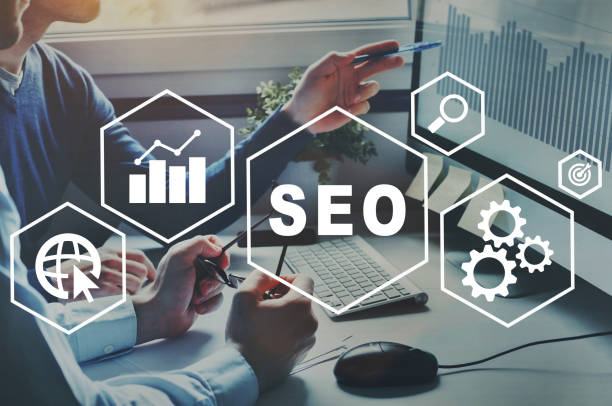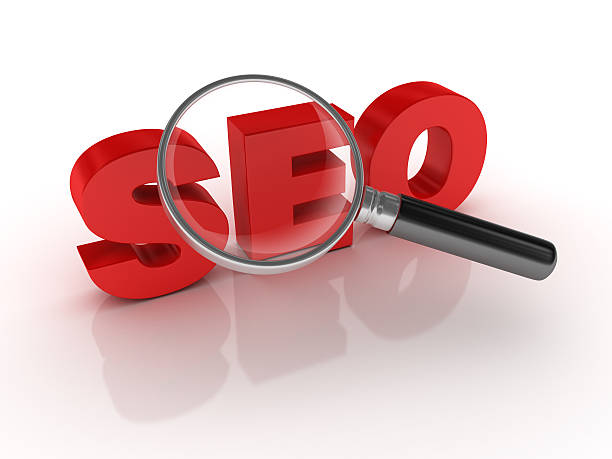What is Off-Page SEO and Why Does It Matter?
Off-Page SEO refers to a set of activities that are performed outside of your website to improve your website’s ranking in search engine results pages (SERPs).
While On-Page SEO focuses on optimizing your website’s content and structure, Off-Page SEO focuses on increasing your website’s credibility and influence in the online world.
The importance of off-page SEO is due to the fact that Google and other search engines use it as one of the main factors in evaluating the credibility and value of your website.
The more websites link to you (backlinks), the more Google recognizes you as a more credible source and raises your ranking.
Off-page SEO is not limited to link building; it also includes other activities such as content marketing, social media, and online branding.
By investing in off-page SEO, you can increase your website’s organic traffic, expand your brand awareness, and ultimately, increase your sales.
Off-page SEO complements on-page SEO, and both are essential for achieving a successful SEO strategy.
With a strong off-page SEO strategy, you can outrank your competitors and establish your position in search results.
In fact, off-page SEO helps you turn your website into an authoritative source in your industry.
Through off-page SEO techniques, you can introduce your brand to more people.
Tired of losing customers due to poor e-commerce website design? With Rasaweb, solve this problem forever!
✅ Increase sales and conversion rate from visitor to customer
✅ Smooth and attractive user experience for your customers⚡ Get a free consultation
Key Off-Page SEO Strategies
Off-Page SEO includes numerous strategies, each of which plays an important role in improving your website’s ranking.
The most important of these strategies are:
- Link Building: Getting links from reputable and relevant websites.
The quality of the links is much more important than their quantity.
Nofollow and Dofollow links are different types of links.
Backlinks from other websites are actually considered a credit for you. - Content Marketing: Producing valuable and engaging content that is shared and linked to by others.
- Social Media: Active presence on social media and sharing content and interacting with the audience.
- Online Branding: Creating a positive and strong image of your brand online.
- Online Directories and Listings: Registering your website in relevant online directories and listings.
- Online Public Relations: Communicating with the media and bloggers to cover news and events related to your brand.
To successfully implement off-page SEO, you need to have a comprehensive and planned strategy.
This strategy should include setting goals, identifying target audiences, selecting appropriate channels, and measuring results.
By properly implementing these strategies, you can significantly improve your website’s ranking and increase your organic traffic.
Using off-page SEO, you can be seen in the competitive world of the Internet.
Link Building: The Heart of Off-Page SEO
Link building is the most important part of off-page SEO.
Backlinks show Google that your website is reputable and valuable.
But not all links are created equal.
High-quality links from reputable and relevant websites have a much greater impact than low-quality links from untrustworthy websites.
There are different methods for link building, including:
- Natural Link Building: Producing high-quality content that is naturally linked to by others.
- Manual Link Building: Contacting other websites and requesting links.
- Broken Link Building: Finding broken links on other websites and suggesting replacing them with a link to your website.
- Buying Links: Buying links from other websites (this method is not recommended and you may be penalized by Google).
When link building, pay attention to the following:
- Quality of Links: Links should be from reputable and relevant websites.
- Diversity of Links: Links should be from different sources.
- Anchor Text: The anchor text should be relevant to the content of the destination page.
- Comply with Google’s Rules: Avoid illegal link building methods.
With a proper link building strategy, you can dramatically improve your website’s ranking. Off-page SEO has a very big impact on your ranking.
| Link Type | Description |
|---|---|
| Backlink | A link from another website to your website. |
| Internal Link | A link from one page on your website to another page on the same website. |
| External Link | A link from your website to another website. |
| Nofollow Link | A link that tells search engines not to follow it and not give it SEO value. |
| Dofollow Link | A link that tells search engines to follow it and give it SEO value. (Default) |
Content Marketing and Off-Page SEO
Content marketing is a powerful strategy for off-page SEO.
By producing valuable and engaging content, you can attract your audience, increase your brand awareness, and get natural links.
There are different types of content you can use for content marketing, including:
- Blog Posts: Writing educational, news, and entertaining articles related to your industry.
- Infographics: Creating attractive and informative images that visually display data and information.
- Videos: Producing educational, promotional, and entertaining videos.
- E-books: Writing comprehensive and specialized e-books on topics related to your industry.
- Podcasts: Recording audio podcasts with guests and experts in your industry.
When producing content, pay attention to the following:
- Value: Content should be valuable to the audience.
- Attractiveness: Content should be engaging and entertaining.
- Optimization: Content should be optimized for search engines.
- Sharing: Content should be easily shareable.
With an effective content marketing strategy, you can significantly improve your website’s off-page SEO.
Through the production of quality content and its publication on different platforms, you can multiply the impact of off-page SEO.
Are you tired of your e-commerce site having visitors but no sales? Rasaweb solves your main problem by designing professional e-commerce sites!
✅ Significant increase in sales with targeted design
✅ Perfect user experience for your customers
⚡ Get a free consultation!
Social Media and Their Role in Off-Page SEO
Social media is a powerful tool for off-page SEO.
By being active on social media, you can increase your brand awareness, increase your website traffic, and get natural links.
To effectively use social media, you must:
- Choose the right social media networks: Choose the social media networks where your target audience is present.
- Create a consistent content strategy: Share content that is valuable and engaging to your audience.
- Interact with your audience: Answer your audience’s questions and comments and communicate with them.
- Be active regularly: Share content regularly and interact with your audience.
Social media does not directly increase your website’s ranking in search results, but it can indirectly help improve your off-page SEO.
For example, sharing your content on social media can lead to increased website traffic, which in itself can help improve your ranking. Off-page SEO can have an impact on your website in this way.
Using hashtags and relevant keywords in your social media posts will help more people become familiar with your content.
Online Branding and Its Impact on Off-Page SEO
Online branding refers to the process of creating a positive and strong image of your brand online.
A strong brand can significantly improve your website’s off-page SEO.
The benefits of online branding for off-page SEO include:
- Increased Brand Awareness: A strong brand is more recognizable and more searched for.
- Increased Website Traffic: More people visit your website.
- Increased Natural Links: More people link to your website.
- Increased Trust and Credibility: A strong brand is more trusted and appears more credible.
For successful online branding, you must:
- Choose a strong brand name: Your brand name should be memorable, relevant, and unique.
- Create a consistent visual identity: Use a consistent logo, colors, and fonts across all your online channels.
- Create a clear and engaging brand message: Your brand message should clearly state what you offer and why they should choose you.
- Continuously interact with your audience: Answer your audience’s questions and comments and communicate with them.
With an effective online branding strategy, you can significantly improve your website’s off-page SEO and establish your position in the market. Off-page SEO is a very important tool for your brand to become known.
Useful Tools for Analyzing Off-Page SEO
To measure and improve your off-page SEO, you can use various tools.
Some of these tools include:
- Ahrefs: A comprehensive tool for analyzing backlinks, keywords, and competitors.
- SEMrush: A powerful tool for analyzing off-page and on-page SEO, advertising, and content.
- Moz Pro: A comprehensive tool for SEO analysis, with a focus on link building and keyword ranking.
- Google Search Console: A free tool from Google that provides valuable information about your website’s performance in search results.
- Majestic SEO: A specialized tool for analyzing backlinks.
Click here to preview your posts with PRO themes ››
Using these tools, you can:
- Check your website’s backlinks: See which websites have linked to you and how good the quality of these links is.
- Identify your competitors’ keywords: See what keywords your competitors are ranking for and how you can outrank them.
- Track your website’s performance in search results: See what keywords your website is ranking for and how you can improve your ranking.
- Identify your website’s SEO problems: See what problems are preventing your website from improving its ranking and how you can fix them.
By carefully analyzing the data from these tools, you can optimize your off-page SEO strategy and achieve better results. Off-page SEO requires constant review and research.
| Tool | Key Features | Price |
|---|---|---|
| Ahrefs | Backlink analysis, keyword analysis, competitor analysis, site audit | From $99 per month |
| SEMrush | On-page and off-page SEO analysis, advertising, content marketing, keyword research | From $119.95 per month |
| Moz Pro | SEO analysis, link building, keyword ranking, site audit | From $99 per month |
Common Mistakes in Off-Page SEO and How to Avoid Them
In off-page SEO, like any other field, there are mistakes that can harm your website instead of improving its ranking.
Some of these mistakes include:
- Buying Links: Buying links from untrustworthy websites can be penalized by Google.
- Over-linking: Linking too quickly and unnaturally can seem suspicious to Google.
- Using Inappropriate Anchor Text: Using inappropriate anchor text can harm your website’s SEO.
- Ignoring Social Media: Ignoring social media can miss many opportunities to improve off-page SEO.
- Not Measuring Results: Not measuring results can make your off-page SEO strategy ineffective.
To avoid these mistakes, you must:
- Have an ethical and sustainable off-page SEO strategy.
- Value the quality of links more than their quantity.
- Use appropriate anchor text.
- Be active on social media.
- Measure your off-page SEO results regularly.
By following these tips, you can avoid common mistakes in off-page SEO and achieve better results. Off-page SEO requires accuracy and awareness.
Does your current e-commerce website design cause you to lose customers and sales?
Rasaweb is your solution with modern and user-friendly e-commerce website design!
✅ Significant increase in conversion rate and sales
✅ Creating strong branding and gaining customer trust
⚡ Get a free e-commerce website design consultation from Rasaweb!
The Future of Off-Page SEO and Emerging Trends
Off-page SEO is constantly changing and evolving.
With changes in Google’s algorithms and the emergence of new technologies, off-page SEO strategies must also be updated.
Some of the emerging trends in off-page SEO include:
- Greater Importance to User Experience (UX): Google gives higher rankings to websites that offer a better user experience.
- Greater Importance to Local SEO: Local SEO is becoming more important for local businesses.
- Greater Importance to Mobile: Websites must be optimized for mobile devices.
- Greater Importance to Artificial Intelligence (AI): Artificial intelligence will play a more important role in SEO.
To succeed in off-page SEO in the future, you must:
- Always be learning and updating yourself.
- Focus on user experience.
- Optimize your website for mobile.
- Use artificial intelligence in your off-page SEO strategy.
By preparing for these changes, you can outrank your competitors and maintain your website’s ranking in search results. Off-page SEO is a dynamic process.
Conclusion and Final Tips on Off-Page SEO
Off-page SEO is a vital part of your overall SEO strategy.
By implementing a strong off-page SEO strategy, you can improve your website’s ranking in search results, increase your organic traffic, and expand your brand awareness.
Key tips for success in off-page SEO include:
- Quality of Links: Links should be from reputable and relevant websites.
- Content Marketing: Producing valuable and engaging content that is shared and linked to by others.
- Social Media: Active presence on social media and sharing content and interacting with the audience.
- Online Branding: Creating a positive and strong image of your brand online.
- Measurement and Analysis: Measuring and analyzing off-page SEO results to improve strategy.
Off-page SEO is an ongoing process.
By constantly tracking and implementing off-page SEO strategies, you can achieve sustainable and long-term results. We hope that this guide can help you improve your website’s off-page SEO and achieve your goals. Help improve off-page SEO by increasing domain authority and producing quality content.
Click here to preview your posts with PRO themes ››
Frequently Asked Questions
| Row | Question | Answer |
|---|---|---|
| 1 | What is Off-Page SEO? | Off-Page SEO refers to a set of actions that are performed outside of your website to improve its ranking in search engines. These actions include building backlinks, social media presence, branding, and so on. |
| 2 | Why is Off-Page SEO so important? | Off-Page SEO shows search engines that your website is reputable, popular, and trustworthy. High-quality backlinks from reputable sites are a strong signal for better ranking and help increase your domain authority. |
| 3 | What are the most important components of Off-Page SEO? | The most important components of Off-Page SEO are: Link Building, Content Marketing, Social Media Marketing, Influencer Marketing, and Online Reputation Management. |
| 4 | What is a backlink and why is it important for Off-Page SEO? | A backlink is a link from another website that points to your website. These links act as “votes of confidence” in Google’s view and indicate the credibility of your content. The more backlinks and the higher their quality, the better your site will rank. |
| 5 | What types of backlinks are there in terms of their impact on SEO? | There are two main types of backlinks: DoFollow and NoFollow. DoFollow backlinks pass authority (Link Juice) and directly affect ranking. NoFollows do not pass authority but can still generate traffic and help make the link profile look natural. (Also UGC and Sponsored) |
| 6 | How can you build high-quality backlinks for your site? | To build high-quality backlinks, you can use methods such as: producing great and shareable content, guest posting on relevant and reputable sites, broken link building, digital PR, and competitor backlink analysis. |
| 7 | What are Toxic Backlinks and how do they affect the site? | Toxic or spam backlinks are links that point to your site from low-quality, spammy, or irrelevant websites. These backlinks can harm your site’s ranking and even lead to penalties by Google’s algorithms. |
| 8 | What is the role of social media in Off-Page SEO? | Although social signals (likes, shares, etc.) are not directly a ranking factor, they help with Off-Page SEO. They increase content visibility, increase direct traffic to the site, and ultimately increase the chance of earning natural backlinks and improving brand awareness. |
| 9 | What is the importance of diversity in the backlink profile? | Diversity in the backlink profile means that your links are from various sources (blogs, forums, news sites, directories), with diverse anchor texts, and with a combination of DoFollow and NoFollow links. This diversity shows Google that your link building is natural and organic. |
| 10 | What are common mistakes in Off-Page SEO that should be avoided? | Common mistakes include: buying backlinks in bulk and from low-quality sources, over-linking with target keywords (Over-optimization), ignoring quality in favor of quantity in backlink building, lack of diversity in the link profile, and ignoring harmful backlinks and failing to Disavow them. |
And other services of Rasa Web Advertising Agency in the field of advertising
Smart Sales Automation: Transform digital branding with the help of attractive UI design.
Smart Website Development: Professional optimization to increase site visits using user experience customization.
Smart Conversion Rate Optimization: A creative platform to improve sales increase with smart data analysis.
Smart Direct Marketing: A dedicated service to grow user engagement based on optimizing key pages.
Smart Website Development: Designed for businesses looking to increase sales by optimizing key pages.
And over hundreds of other services in the field of internet advertising, advertising consulting and organizational solutions
Internet advertising | Advertising strategy | Advertisement report
Resources
What is Off-Page Optimization?
,What is off-page SEO? A comprehensive guide to off-page optimization
,Off-Page SEO: Strategies for Building Authority
,Off-Page SEO: What It Is, Why It Matters & How To Do It
? In Rasaweb Digital Marketing Agency, your digital dreams come true with our expertise. From professional SEO optimization to secure website design and creative advertising campaigns, we are your partner in the digital world.
📍 Tehran, Mirdamad Street, next to the Central Bank, Kazerun Jonubi Alley, Ramin Alley No. 6
“`












